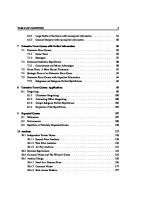Symbolism and Truth: An Introduction to the Theory of Knowledge [Reprint 2013 ed.] 9780674330689, 9780674280731
195 31 9MB
English Pages 344 Year 1925
PREFACE
CONTENTS
INTRODUCTION
CHAPTER I. MEANING
CHAPTER II. LOGICAL FORM
CHAPTER III. UNIVERSALS AND INDIVIDUALS: ORDER
CHAPTER IV. DESCRIPTION AND ANALYSIS
CHAPTER V. TRUTH AND FALSITY
CHAPTER VI. NEGATION AND CONTRADICTION
CHAPTER VII. FORMAL DEDUCTION
CHAPTER VIII. THE METAPHYSICS OF KNOWLEDGE
SUPPLEMENTARY READINGS
INDEX
Recommend Papers
![Symbolism and Truth: An Introduction to the Theory of Knowledge [Reprint 2013 ed.]
9780674330689, 9780674280731](https://ebin.pub/img/200x200/symbolism-and-truth-an-introduction-to-the-theory-of-knowledge-reprint-2013nbsped-9780674330689-9780674280731.jpg)
- Author / Uploaded
- Ralph Monroe Eaton
File loading please wait...
Citation preview
SYMBOLISM AND TRUTH
LONDON : HUMPHREY MILFORD OXFORD UNIVERSITY PRESS
SYMBOLISM AND TRUTH AN INTRODUCTION TO THE THEORY OF KNOWLEDGE
BY
RALPH MONROE EATON, PH.D. INBTBUCTOR AND TUTOR IN PHIL080PHT HABVABD UNIVERSITY
CAMBRIDGE HARVARD UNIVERSITY PRESS 1925
COPYRIGHT, 1925 BT HARVARD TJNTVEBSITT PRESS
FBIMTED AT THE HABVABD UNIVERSITY PRIS8 CAMBRIDGE, MASS., U.S.A.
TO Ii. e . IN GRATITUDE FOR FAITH AND WORKS
When I heard the learn'd astronomer; When the proofs, the figures, were ranged in columns before me; When I was shown the charts and the diagrams, to add, divide, and measure them; When I, sitting, heard the astronomer, where he lectured with much applause in the lecture-room, How soon, unaccountable, I became tired and sick; Till rising and gliding out, I wander'd o f f by myself, In the mystical moist night-air, and from time to time, Look'd up in perfect silence at the stars. W A L T WHITMAN,
Drum Taps, 1865
PREFACE T H E theory of knowledge, occupying as it does the borderland between psychology, logic, and metaphysics, is a peculiarly difficult subject to isolate and study in itself. The materials are widely scattered through philosophical literature, discussions of the problems appear in works of the most diverse character, and any one who attempts to single out the essential questions will be sure to omit some that are important in the eyes of many people and to include others that might be omitted. He will place his emphasis somewhere, with the result that he will fail to stress points that perhaps equally deserve emphasis. By way of remedy therefore he ought to indicate his angle of approach and call attention to what he believes are the major gaps in his treatment. The method of the present work is mainly .critical and analytic, rather than speculative.1 A single line of attack, which goes at once to the heart of the problem, is chosen—namely, the röle of symbols in knowledge; and about this the entire analysis is organized. Knowledge is inseparable from its expressions; a study of these expressions should therefore throw light on the theory of knowledge as a whole. With this conviction, I begin by examining meaning. But unfortunately the psychology of meaning is still in a fluid state, and the most that one who is not a psychologist can do is to point out in a rough way that to which, in his own experience, he gives the name "meaning." The consideration of the logical forms of meanings leads to a discussion of the nature of facts, relations, qualities, universale and indi1
See Mr. C. D. Broad's interesting statement of the difference between critical and speculative philosophy in Contemporary British Philosophy, edited by Professor J. H. Muirhead





![An introduction to the theory of knowledge [1 ed.]
9780521842136, 9780511271182, 0511271182, 0521842131, 0521603099, 9780521603096](https://ebin.pub/img/200x200/an-introduction-to-the-theory-of-knowledge-1nbsped-9780521842136-9780511271182-0511271182-0521842131-0521603099-9780521603096.jpg)



